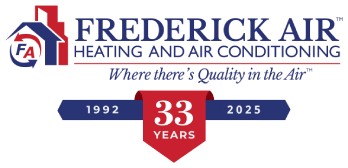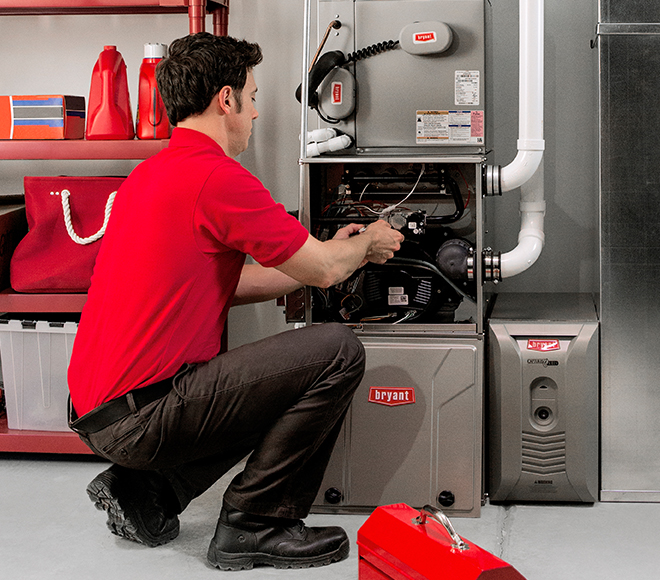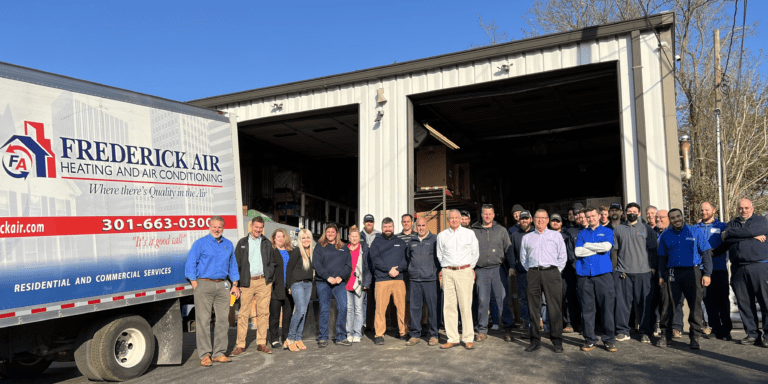
An HVAC unit may typically make a quiet, buzzing sound in the background even when it’s working properly. Unusual noises coming from your outdoor unit could be a sign that it needs repair or maintenance. Some of these noises may even signal problematic or dangerous situations that require immediate action. This is why it is recommended that you have a well-established relationship with a trusted local HVAC company that’s available 24/7, like Frederick Air.
Be sure to address the issue if you hear any of the following noises coming from your unit.
Is your unit making any of these sounds?
Humming
An HVAC unit that is running properly can make a quiet humming noise as a result of normal operation. There are a lot of components in your system that could produce a small, noticeable, constant low-level noise while in use. But if it sounds more like scraping or metal rubbing together; that’s usually a sign that something is wrong. The noises could come from loose fasteners, old or worn bearings on shafts, the blower motor fan, or loose components that are rubbing against each other due to the constant vibrations in a machine when it’s running. A humming noise that is loud or pronounced could possibly come from a worn transformer or inefficient contactor.
Excessive noises can be a bit more serious if ignored because they can end up causing expensive damage to your system. If you notice an unusual or loud noise that you are unfamiliar with, the best thing you can do is turn the system off and call a professional.
Rattling
A rattling noise coming from your HVAC system could likely be associated with the fan motor or blade. This could be a defective motor, an unbalanced fan blade, or even debris caught in the system. Your outdoor unit has a grate or outer cage that will prevent most things from getting into the system but it’s certainly a possibility and something you can check yourself simply by taking a look at the system.
Turn your system and the power off, look down into the outdoor unit and see if there is something obviously causing the problem. You may be able to remove the debris by removing a few screws to gain access. If you see any damage to the compressor, condenser coils, motor or fan blade, call a professional. If you think the rattling is originating from your furnace or air handler, turn the item off and call a technician; removing an obstacle from the blower motor may not be as simple.
Hissing
A hissing noise could very well mean that your indoor filter is extremely dirty. If you haven’t checked it in a while, this is the first place to look. If the noise is coming from around your indoor furnace or air handler, you could have leaky connections at the unit or in the connecting ductwork. Does it seem like it’s coming from the walls? Then your ducts might be leaking. Leaky ducts cost you money and create dust in your home because the air is going into the walls and pushing out into the wrong places. Call a technician to see how this can be fixed.
Additionally, loud hissing noises at your registers could be a function of an improperly sized system or a fan speed setting. Again, it would be time to call a professional.
Loud Whistles or Screaming
Hearing a screaming or whistling noise from your HVAC system probably means that you have a fan system that is trying to push too much air through your ductwork. As stated above, the problem may be an improperly sized system, fan setting, or a fan design flaw. These situations could be costing you money and really hurting your system’s efficiency; you should call an HVAC technician.
Crackling or buzzing
When crackling or low-pitched buzzing noises appear near the circuit breaker(s), compressor relay switches, or electrical connections, you could have a dangerous electrical issue that must be solved right away to prevent the risk of fire. Turn the system off and call a professional immediately.
We recommend having your system maintained twice a year to avoid the hassle of self-diagnosing issues like the ones listed above. A maintenance visit will ensure your system running at optimal efficiency. Is it time for your appointment? Click here to schedule your next preventative maintenance visit online.




